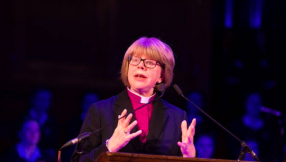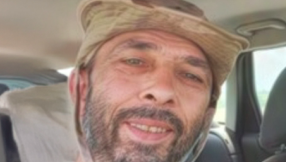Ukraine chose the head of a new national Orthodox church on Saturday, marking an historic split from Russia which its leaders see as vital to the country's security and independence.
President Petro Poroshenko said 39-year-old Metropolitan Epifaniy of the Kiev Patriarchate church had been chosen as head of the church by a 200-strong council, comparing the move to Ukraine's referendum for independence from the Soviet Union in 1991.
'This day will go into history as a sacred day ... the day of the final independence from Russia, Poroshenko told thousands of supporters, who shouted 'Glory, glory, glory.'
'And Ukraine will no longer drink, in the words of Taras Shevchenko, "Moscow's poison from Moscow's cup,"' he said, quoting the country's national poet.
Relations between Ukraine and Russia collapsed following Moscow's seizure of Crimea in 2014. Ukraine imposed martial law in November, citing the threat of a full-scale invasion after Russia captured three of its vessels in the Kerch Strait.
The Ukrainian Orthodox church has been beholden to Moscow for hundreds of years and Ukraine's leaders see church independence as vital to tackling Russian meddling.
Kiev says Moscow-backed churches on its soil are a Kremlin tool to spread propaganda and support fighters in the eastern Donbass region in a conflict that has killed more than 10,000 people. The churches strongly deny this.
Epifaniy was chosen by a council at the St Sophia Cathedral in Kiev. He said on Sunday at his first service as head of the church: 'We must complete the unification of Ukrainian Orthodoxy...pray for an end to the war [in eastern Ukraine], and for a just peace in Ukraine.'
Patriarch Filaret, a long-time campaigner for an independent Ukrainian church who many had assumed would be elected as its first head, was granted the lifetime title of Honorary Patriarch.
A triumphant Poroshenko arrived in the morning, shaking hands with people, clenching his fist and crossing himself. The new church may boost the pro-Western leader, who lobbied hard for its creation and faces a tight election race in March.
'It is a church without a prayer for Russian power and the Russian army that kills Ukrainians,' Poroshenko told the crowd after the announcement was made.
But Russia bitterly opposes the split, comparing it to the Great Schism of 1054 that divided western and eastern Christianity. Russian Orthodox Patriarch Kirill made a last ditch appeal this week against the process.
On Saturday, the Russian church called the council a failure because only two members of the church it supports in Ukraine had attended the meeting, according to Interfax news.
Spokesman Metropolitan Hilarion said the plan 'to persuade the canonical Ukrainian church to participate in the creation of the new structure failed...with the exception of two traitors' – Bishops Simeon and Aleksandr, who attended the council.
Ecumenical Patriarch Bartholomew is expected to confirm the council's decisions in January.
'Rough pressure'
Ukraine won approval for the new church in October from the Ecumenical Patriarchate in Istanbul, the seat of the global spiritual leader of Orthodox Christians.
'We want to support the process of Ukraine's split from Moscow and for us to have our own church, which is not governed from the Kremlin,' said Lyudmyla Alekseyeva, 66, a pensioner who had come to the event with her daughter and granddaughter.
'The church should not depend on those who fight against us in the Donbass.'
Supporters wore ribbons in the blue and yellow colours of the Ukrainian flag, with the message 'We are going our own way.' Many had waited outside in freezing temperatures while the council deliberated.
Religious divisions deepened in Ukraine after 2014 and two Orthodox factions vied for dominance.
The church known as the Moscow Patriarchate, aligned with the Russian Orthodox Church, sees itself as the only legitimate church in Ukraine.
The rival Kiev Patriarchate was born after the collapse of the Soviet Union and its popularity has grown since 2014. It favours European integration and championed the independent church but the Moscow Patriarchate denounces it as schismatic.
Ukraine's state security service raided Moscow Patriarchate church properties in the run-up to the council, but denied the raids were an attempt to silence opposition to independence.
Patriarch Kirill had appealed to world leaders, including German Chancellor Angela Merkel and French President Emmanuel Macron, ahead of the council.
'Recently, the intervention of the leaders of the secular Ukrainian state in church affairs has acquired the character of rough pressure...which allows us to speak about the beginning of full-scale persecutions,' he said.
Additional reporting by Reuters.













